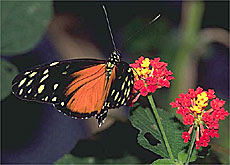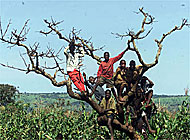Swiss scientists to unlock Costa Rica’s potential

Swiss scientists are due to begin screening a vast collection of natural organisms from Costa Rica in a bid to discover new pharmaceutical products.
They say the fair set-up of the project should counter criticism that western experts are plundering the biological resources of developing countries.
Zurich’s Federal Institute of Technology says the partnership with Costa Rica’s National Institute of Biodiversity (INBio) – a non-governmental organisation – places both parties on an equal footing and seeks to redress the “north-south technological divide”.
“There is an imbalance between the technology in rich countries and the biodiversity in others,” Gerd Folkers, one of the project’s leaders at the institute, told swissinfo.
“This partnership aims to try to correct this situation.”
Folkers explains that the Costa Ricans have compiled a collection of over 2,000 extracts of all kinds of organisms as part of their National Biodiversity Programme, but lack the modern means to screen the collection.
The Institute’s scientists will be taking a close look at natural compounds found in the organisms to examine their effects on certain types of cancer, as well as assessing their physical, chemical and genetic properties.
Biopiracy
Folkers hopes that the equitable nature of the partnership with INBio will allay concerns by non-governmental organisations of “biopiracy”, adding that a legal framework has been set up in the case of a major discovery.
“We will have an agreement to specifically outlines any benefit sharing,” said Folkers. “We are used to this kind of agreement and so are the Costa Ricans.”
The Swiss-based NGO, the Berne Declaration, says the partnership is definitely a step in the right direction.
“This is a positive example of what can be done,” said the Declaration’s Bernhard Herold. “The institute has so far been very respectful of the international Convention on Biological Diversity.”
Legal rights
Herold told swissinfo that Costa Rica actually faces fewer risks than other developing countries when it comes to preventing biopiracy.
“The Costa Ricans have been very protective of the legal rights for their biological resources,” he said. “If anything, they’ve had more trouble actually safeguarding their biosphere from human development.”
Costa Rica is an important source of natural compounds, thanks to its 11 different climate regions. While it represents just 0.03 per cent of the earth’s land surface, it is estimated that at least four per cent of the planet’s living species are found there.
Cooperation
Costa Rica’s ambassador to Switzerland, Isabel Montero de la Camara Montero, explains that the project is in line with the needs of scientists in her country, who are not looking for aid, but cooperation.
“We are the most computer-literate country in Central America and our third biggest export is microchips,” she told swissinfo.
“And we know how to select the most promising compounds – but what we need from the Swiss is their capacity to refine the analysis.”
Virtual lab
While Costa Rica may be lacking some types of technology, its scientists will not be cut off from the researchers’ work in Zurich.
Thanks to the virtual reality lab technology implemented at the institute, the Costa Ricans will be able to closely follow the work of their colleagues.
“The virtual lab will allow us to truly exchange information with INBio’s scientists,” Folkers said.
swissinfo, Scott Capper
Zurich’s Federal Institute of Technology is preparing a partnership with a Costa Rican NGO, the National Institute for Biodiversity.
The Swiss will screen and analyse natural compounds selected by the Costa Ricans for pharmaceutical properties against known diseases, notably certain types of cancer.
Both parties will also be able to work together in real time, thanks to virtual laboratory technology.
In case of a major discovery, both parties will share the benefits according to a specific legal agreement.

In compliance with the JTI standards
More: SWI swissinfo.ch certified by the Journalism Trust Initiative

You can find an overview of ongoing debates with our journalists here. Please join us!
If you want to start a conversation about a topic raised in this article or want to report factual errors, email us at english@swissinfo.ch.